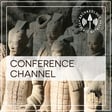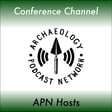
068- EAA2019 - Francesco Ripanti
Tristan of the APN spoke to Francesco Ripanti about his public archaeology work.
Francesco Ripanti has a PhD in public archaeology from the University of Pisa, with a project focusing on participation in Italian community archaeology. Graduated with a Master’s thesis in archaeological methods at the University of Siena, his research covers several themes related to public archaeology, heritage and museum studies. Greatly interested in archaeological storytelling and communication, he has tried out his skills authoring short videos set at the Roman site of Vignale (Italy), short stories about 25 objects exhibited at Museo Archeologico Nazionale delle Marche (Ancona, Italy) and for a digital storytelling prototype at the Ancient Agora of Athens (Greece).
http://archeovideo.wordpress.com.

